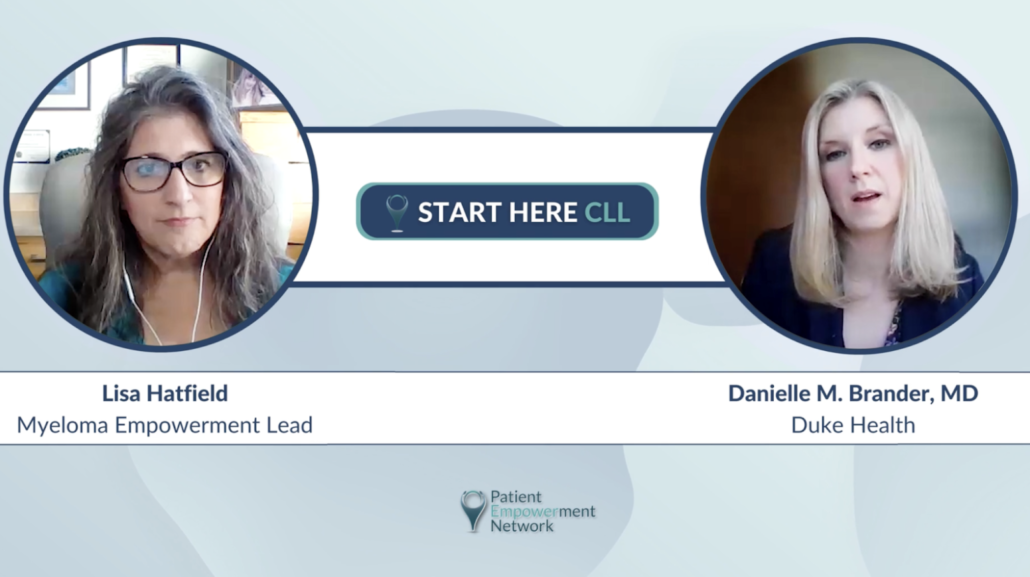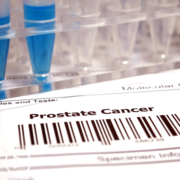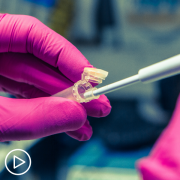CLL Patient Expert Q&A: Dr. Danielle Brander from Patient Empowerment Network on Vimeo.
START HERE bridges the expert and patient voice, enabling chronic lymphocytic leukemia (CLL) patients to feel comfortable asking questions of their healthcare team with precision. In this program, CLL expert Dr. Danielle Brander speaks to managing CLL side effects, emerging novel CLL therapies and treatment options for CLL progression.
Dr. Danielle Brander is an Assistant Professor in the Division of Hematologic Malignancies & Cellular Therapy at Duke University Medical Center. Learn more about Dr. Danielle Brander.
Download Resource Guide | Descargar Guía en Español
See More from START HERE CLL
Related Programs:
Transcript:
Lisa Hatfield:
Welcome to this START HERE, Patient Empowerment Network program. This program bridges the CLL expert and patient voices, enabling patients and care partners to feel comfortable asking questions of their healthcare team. Joining me is Dr. Danielle Brander, a CLL specialist serving as assistant professor in the Division of Hematologic Malignancies and Cellular Therapy at Duke University Medical Center. Dr. Brander directs the chronic lymphocytic leukemia or CLL and lymphoma program and serves as primary investigator for CLL focus clinical trials. Thank you so much for joining us, Dr. Brander.
Dr. Danielle Brander:
Thanks for having me, Lisa.
Lisa Hatfield:
The world can be complicated, but understanding your chronic lymphocytic leukemia diagnosis and treatment options doesn’t have to be. The goal of START HERE is to create actionable pathways for getting the most out of CLL treatment and survivorship. Before we get started, please remember to download the program resource guide via the QR code. There is great information there that will be useful during this program and after. So let’s get started. Dr. Brander, I’d like to talk about what’s on the CLL treatment radar. There’s a lot going on in terms of emerging treatment options, clinical trial data, and other learnings from the CLL community. Before we jump into a detailed discussion, can you provide an explanation of what CLL is?
Dr. Danielle Brander:
Absolutely. So CLL, or chronic lymphocytic leukemia, we generally think of as blood cancer. But often as you hear the ending of that, the name leukemia, we also think of it as a lymphoma, meaning patients can have the spectrum of an elevated white count like you might think of in terms of a leukemia. They can also, like a lymphoma though, have enlarged lymph nodes or spleen. And often patients are diagnosed incidentally and that just means that they’re…in seeing their physician or their medical team for other reasons. And they might have had a blood test, and their white counts elevated.
Or they might notice they have a tiny enlarged lymph node or found on screening for other cancers, for example. And so the takeaway there is that many patients don’t necessarily have symptoms and certainly often many patients don’t have reasons to need to start treatment at the time they’re diagnosed. So in terms of what it is today, I think more and more patients are being diagnosed both because it is something that comes about as patients get older, but also because it’s found during routine other visits. And so more and more patients I think are found incidentally that way.
Lisa Hatfield:
Okay, thank you. So just a follow-up question to that, if a patient goes into their primary care provider and finds something unusual that might indicate CLL, will they be referred to a hematologist right away at that point? Usually?
Dr. Danielle Brander:
So that is a great question. Often they are, for example, if they’re noted to have a high white count or, specifically a type of white cell called lymphocytes. However, there are many things that can cause that or cause a small lymph node. And so, some primary care appropriately, if those changes are small and they could be due to other things like an infection, for example, then their primary care might want to follow up first. And if things go away, it may not be related to a cancer at all.
But if it’s something that persists or it seems very out of range, or primary care, who, you know, are specialists and seeing kind of changes all the time, and may say this seems a little bit out of range, then even before something’s diagnosed, patients might be referred to a hematologist or an oncologist to help with that workup. But often because primary care is so astute in seeing these things, they may counsel patients to say, let’s send this test or this test to get things going while we’re speaking to a hematologist or oncologist.
Lisa Hatfield:
We have CLL patients and care partners who are newly diagnosed in active treatment, watch and wait, and also living well with their disease. Joining this program no matter where you are in your CLL journey, START HERE provides easy-to-understand, reliable, and digestible information to help you make informed decisions. So, Dr. Brander, we’re going to get into a more detailed discussion now of CLL. Can you talk a little bit about the novel pathways and targets that are currently under investigation in CLL, and what are the most important highlights from those for patients and their families and care partners?
Dr. Danielle Brander:
Yes. So over the last decade or even the last five years, for patients diagnosed with CLL, there’s been a very encouraging and marked change in the available treatments that is, you know, not that many years ago we generally only had chemotherapy or chemotherapy combined with these antibody targeted treatments that we call immunotherapy sometimes.
But in the last 5 to 10 years we’ve seen quite a remarkable change in treatments that target, meaning often they go after pathways or ways that the CLL cells have learned to grow or have learned to not die the way that normal cells should, die after certain time points. The two main categories of treatments that are approved for CLL treatment, either for patients as a first treatment or patients that have had treatment before including prior chemo or other agents are called BTK inhibitors or BCL-2 inhibitors.
BTK is something inside the leukemia cells. It’s also in some of our other cells. But in the CLL cells particularly, they’re very sensitive in needing that protein. So in targeting that BTK inhibitors keep the cells from getting the normal signals that they need to stay alive, and so the lymph nodes that are big get smaller, a spleen that might be big get smaller, white count eventually comes back down, for example. And those BTK inhibitors have also already encouragingly changed over recent years.
So there was…you’ll hear people say first generation, these were the first inhibitors that came out, that was a drug called ibrutinib (Imbruvica), which is still around. And then there are second generation that are approved that have come out as first treatment or treatment for previously patients that receive treatment.
Those second-generation BTK inhibitors are called zanubrutinib (Brukinsa) and acalabrutinib (Calquence) that are approved. The main other approved category of these targeted treatments I mentioned is venetoclax based treatment. And that targets something different, that targets a set of proteins inside the cell that tell the cell to stay alive too long. And so you have this accumulation and venetoclax targets that pathway. And the last thing I’ll mention about the BTK inhibitors that’s emerging is now there are trials of what are called non-covalent BTK inhibitors.
So they work in a different way, they go after BTK and so that they can work. The non-covalent, even for patients where the first and second-generation, traditional covalent BTK inhibitors I mentioned stop working, those are not yet approved officially for CLL, though they’re approved in mantle cell lymphoma. That’s a drug called pirtobrutinib (Jaypirca), that’s a non-covalent BTK. And the reason that emerging set of treatment, as I mentioned, is important is because it can work for patients where the first or second-generation covalent BTK inhibitors stop working. The venetoclax (Venclexta), as I mentioned, works by a different mechanism. So patients, of course, where the BTK stopped working, in many cases venetoclax can be helpful as well.
Lisa Hatfield:
Great. Thank you so much. So I read a little bit, I did a little research on trials that you’re involved in, and there is a trial the EVOLVE CLL trial, and I wonder if you can talk about that a little bit because I think it is exciting for patients to hear that there might be an option for earlier intervention. And I’m not sure if you’re allowed to talk about any results yet, but if you can speak to results, that would be great to hear about those results too.
Dr. Danielle Brander:
Well, yes and no, thank you for bringing this up because this is very important. As you mentioned, it’s called the EVOLVE study. It’s led by a national cooperative group called SWOG, meaning there are lots of places that it’s available, not just larger centers, but smaller oncology centers as well. And this is to look at what’s called early intervention, meaning as we spoke about before, most patients with CLL don’t need treatment at the time that they’re diagnosed. The reasons for treatment are, we call those treatment indications are based on three main categories that I’ll just review. For some patients, it’s new or progressive symptoms like weight loss or, very symptomatic limiting life day-to-day activities like night sweats or fatigue, for example, that’s the first category of reasons some patients might need treatment is unmanageable side effects.
The second main category is if the lymph nodes get very large or impacting on organ function, or the same for the spleen, it’s getting very large to a certain size, or it’s affecting your ability to eat regular meals or losing weight. And then the last category of treatment indications that we generally wait to start treatment for are if it’s affecting the normal blood count.
So there’s not one magic white count where patients need to start treatment, but almost like weeds in a garden, if those CLL cells are crowding out the red blood cells, so the hemoglobin’s falling or it’s crowding out the platelets, so the platelets are crowding and can’t grow and reach a certain threshold, then we recommend treatment. Of course, there are scattered other reasons, but those are the main three categories. And the reason of waiting to start until those are met is because historically trials have been done to look at waiting for those indications versus treating around the time of diagnosis.
Those trials so far have included chemotherapy by itself or chemotherapy in combination. And most recently there was a trial looking at first-generation ibrutinib that was given continuously. And so far there’s been no survival. So no life expectancy benefit to early treatment versus waiting for those indications. And the other reason generally not treating all patients is because some patients never require treatment, about a quarter of patients. So if we offer treatment to everybody, at the time of diagnosis, there are patients that would get treatment that would be exposed to side effects and never needed. But what the EVOLVE study is uniquely looking at is randomizing. And randomizing means some patients will get treatment and some patients will wait until those traditional reasons to need treatment. But for those randomized to receive therapy, it’s that venetoclax based treatment combined with this antibody called obinutuzumab (Gazyva).
And the way that treatment is given for patients, is the same way it’s given for patients who outside of the trial need treatment, meaning they get the antibody infusion, then they get the venetoclax pill, but it’s for a fixed duration, meaning a total of one year of treatment. The trial is also only for patients with higher-risk CLL. So as I mentioned, some patients never need treatment, some patients do, some patients need it quicker. So rather than looking at this trial and saying all patients, including those with CLL, that’s likely to be slower-growing. The EVOLVE trial is only for patients who are more likely to need treatment in the next couple of years. And the way that’s determined is a score called the CLL-IPI score, and CLL-IPI tries to identify patients more likely to need treatment in the next couple of years by a couple of key factors.
Stage at the time of diagnosis, it looks at age, and it looks at key factors of the leukemia itself, including something called deletion 17P or TP53, because that marker in the cells is a high risk of eventually needing treatment. So to answer your question, what EVOLVE is looking at is taking higher-risk patients, so patients rather than all patients more likely to need treatment anyway, and around the time of diagnosis, randomizing to either be treated or to follow the traditional, sometimes called watch and wait or dynamic monitoring until they reach traditional markers. And ultimately, and it’ll likely take many years to look at, ultimately the question is looking at if that helps prolong patient survival by having higher-risk patients receive that fixed-duration treatment earlier in time. We don’t yet have any results or any results to share, because the study is still enrolling.
But again, I think it’s something for patients to be aware of, because it does look at the higher risk patients. But around a year, it has to be within a year of diagnosis. So patients who are newly diagnosed, the question to ask your oncology team is “Do I qualify?” if it’s something you’re interested for, and they’ll help walk you through that. If you haven’t had markers checked, for example, it might be a good time to ask about that, to see if this is something would be available, even if not available though, it does create a time to talk to your team about the markers, because those can inform regardless of trial or not maybe what to expect in coming years and likelihood of treatment.
Lisa Hatfield:
Great, thank you for that. So as a cancer patient, one of the biggest questions I had when I was diagnosed, you hear the word “cancer” or in this case “CLL leukemia.”Two questions. One of them, is there a cure for CLL? And if not, are any of the…are there any trials looking at a cure for CLL?
Dr. Danielle Brander:
Yes. Excellent. An understandable question. Traditionally, we say that CLL or others slower-growing, or sometimes you’ll hear the term indolent lymphomas, do tend to be slower-growing. Some patients don’t need treatment. But the flip side of that is we generally think of them as not curable, that they’re a chronic condition and that treatment, the goal of treatment is to knock it down and relieve whatever symptoms or indications or reasons you’re starting treatment are.
But at some level, we historically think of CLL as either eventually coming back or sticking around, so to speak. However, I think most oncologists, most those in the field, feel that some of the treatments that are around or in combination, that we’re going to have some patients that have maybe what a term might be functional cure or individual, cure-like condition.
Meaning if our newer treatments for some patients can knock down the CLL so much that it either doesn’t come back or take so long to even show itself again, in a way that serves as what the purpose of cure, really is, which is to get it down to levels that it’s not causing problems or not coming back, for the lifetime of the patient. Bone marrow transplant is the only therapy historically that has been cured, has offered a cure for some patients. The downside and the reason that most patients aren’t referred to for bone marrow transplant is the risk side of it. Meaning, unfortunately, a bone marrow or stem cell transplant has such a high risk of directly causing side effects.
That could be life-limiting or chronic side effects from the transplant itself versus the agents available now that we aren’t using or referring to bone marrow transplant nearly as much, but I think it’s really encouraging what we’re seeing in responses. So we talked already about those main categories of BTK inhibitors or venetoclax, I didn’t yet talk about, but there are many trials that have looked at those in combination, or CAR T, for example, or bispecific antibodies that are knocking down the CLL to such low levels. But the hope is that serves as a way of functional cure. But it’s going to take time to see if that’s the case. But we’re all very encouraged and really believe that that’s on the horizon.
Lisa Hatfield:
Great. Thank you so much. And even a functional cure sounds really hopeful, so I’m happy to hear that term. Thank you. And I want to be cognizant of your time and the time of everybody watching. So we are going to move into some of the questions that we’ve received from you watching this, patients. Remember, as patients, we should always feel empowered to ask our healthcare providers any and all questions we might have about our treatment and prognosis. Please remember, however, this program is not a substitute for medical care and always consult with your own medical team. So, Dr. Brander, let’s start here. How do you explain, you kind of covered this a little bit, CLL treatment options and prognosis to your newly diagnosed patients? And I think that the prognosis piece is really important, especially if they do start treatment.
Dr. Danielle Brander:
Sure, absolutely. So, what are the things we’re looking for in terms of needing treatment? Because some of those, especially the symptoms we’re noting a lymph node or spleen, for example, or symptoms of anemia, which is low red cells or bleeding from low platelets, it’s helpful for patients to understand what we’re looking for, but, of course, in the time between visits those are the things we want to help patients with if they notice.
And so we encourage them all the time to call our triage or send us, you know, most electronic medical records now, have ways to send your team a message. And we want to know about that from patients in between visits. In terms of prognosis, as I mentioned before, there are other CLL-specific labs usually on the blood, meaning a regular blood draw.
Most patients don’t need another lymph node biopsy or a bone marrow biopsy, though that happens in some cases. And two of those or some of those key markers I mentioned before, but they test in the leukemia, there’s one test called the FISH, F-I-S-H, it’s not specific to CLL, we use it in other cancers. But it’s to look for specific changes in the leukemia genomics, meaning the DNA, the genetic material of the leukemia, not genetics you’re born with, but the cancer itself.
And there are specific patterns and that can be helpful as I sit down with patients to say this isn’t 100 percent, but this is kind of what to expect and likelihood of needing treatment over the next couple of years. There’s another test called IGHV, another mutation test TP53 kind of beyond this to go over right now, but as you mentioned, I think it’s important to meet with your medical team and say, ‘How does this pertain to me specifically?”
In terms of prognosis, I think there’s two parts to that of understanding what to expect. There’s likelihood of needing treatment, there’s likelihood of time to treatment, and those kind of markers and staging system help in a good way. Right now, our historical expectations, meaning 5 or 10 years ago, we could often also sit with patients and say, “This is the prognosis in terms of survival.” Expected life expectancy on average, but in a good way, most of our systems nowadays with the newer treatments likely vastly underestimate patient survival, meaning those systems were designed when we only had chemotherapy treatments.
Now, we know patients even with the highest risk markers, the faster progressions are living, you know, years and years beyond what was expected with chemotherapy. So I just caution especially materials around from just a couple of years ago that likely they don’t pertain, but they can be helpful in knowing what to expect.
Lisa Hatfield:
Great, thank you for that. Answering that question. We have a couple of questions about BTK inhibitors, and you already talked a little bit about the role of those and why they’re significant in treating CLL. But another patient’s asking about the, of course, a lot of patients wonder, what are the side effects? They hear chemo and like, “Oh, my gosh, the side effects are going to be off.” Can you talk about the side effects and even maybe some unusual side effects that you’ve heard of from patients when using the BTK inhibitors?
Dr. Danielle Brander:
Sure, absolutely. And so again, really important, these are things that as we maybe anticipate patients are going to start treatment, this is a long discussion of deciding between treatment, for example, as first treatment. There’s no trial saying one path is necessarily better than the other. So we try to individualize choosing between BTK inhibitors or that venetoclax-based therapy I mentioned. Some of that though comes about and what expected side effects are expected side effects for the individual. I try for patients to hear it from myself, other members of the team, the nurse, our pharmacist, for example.
And so patients shouldn’t feel overwhelmed to keep asking about what to expect or new side effects. There are some side effects we talk about regardless of the treatment. So I’ll just point out, anytime you’re starting treatment, you’ll hear the team talk about risk for infection, monitoring for fevers, reaching out to us about those kinds of side effects, lower blood counts that can happen regardless, not specific to BTK though it can happen there as well.
There’s some specifically though with BTK inhibitors, we ask patients to watch out for. Some BTK inhibitors can cause some cardiovascular side effects, meaning watching out for funny beating of the heart or what we call palpitations, skipped beats. There can be arrhythmias, some patients can have with time elevation in their blood pressure, for example. And then risk for bleeding, meaning BTK inhibitors affect how the platelets stick together similar to what aspirin does.
So the platelet levels may be normal but patients might have easier bruising, just generally manageable. But if there’s any kind of bleeding, certainly the team should be aware. It’s also the reason though, if you’re on a BTK inhibitor and you have a planned surgery or procedure, let your team know, because we may recommend or a lot of times recommend holding the medication before and after certain surgeries or procedures.
Other side effects can be muscle or joint aches. Some patients have some gastrointestinal side effects like looser stools or sensitivities to certain food causing looser stools, for example. And then there are some that are specific to the individual BTK inhibitor. This is the one point I’ll mention that first-generation BTK inhibitor ibrutinib, part of the reason for the second-generation zanubrutinib and acalabrutinib is not necessarily of them working better but to have less of these side effects that I just mentioned.
Lisa Hatfield:
Great, thank you for that. So this patient is telling us that he’s trying to plan life while living with cancer. It’s a challenge. It’s hard to know where to start. Can some patients go off of ibrutinib? I don’t say…ibrutinib after five years and enter a watch-and-wait kind of program. And will they be monitored during that time too, if they ever do go off of the medication?
Dr. Danielle Brander:
Yeah. So again, more excellent, excellent questions. So of those main categories of treatment, the BTK inhibitors are given continuously, meaning, at least so far, the standard way we recommend of those treatments is that they’re taken every day, either once or twice a day, depending on which BTK inhibitor, and they’re taken every day. Unless patients run into progression, meaning the CLL learns to grow through its resistance or patients run into side effects that despite maybe team’s recommendation of changing the dose or holding the medications, that it’s just the medication is just not tolerated.
In those cases, there are cases where we do recommend stopping the treatment because of side effects. And the key there is that patients if depending how long they’ve been on treatment or how their CLL is responding, might not need to go on to the next treatment right away.
So to answer this patient’s question, if they were to run into a side effect that wasn’t manageable, there are patients where we say, stop treatment and let’s just watch things, see if you need treatment, if your CLL has no other reason to jump into the next therapy. And there have been encouraging things that we’re learning and that I think are hopeful to this patient’s question, which is maybe in the future there are patients where we proactively can tell them to stop after a certain time because of what we’ve learned for patients so far. But at the current moment in time, we don’t tell patients to stop at a certain amount of time.
But there are trials that are looking at that after a certain number of years. And there are also trials that have followed patients who have stopped therapy and some of those patients, as I mentioned, who are told to stop treatment due to other side effects or other reasons, may go a long time, a couple of years before they need to start therapy.
Lisa Hatfield:
Okay, great. Thank you. I’m going to add one little question there too, if you don’t mind. So we’ve talked about trials a little bit, and I know that patients can go to clinicaltrials.gov, but what if a patient lives in an area that doesn’t have a major academic center or maybe trials aren’t being done very much in their area? Do you have a recommendation for patients? Should they just ask their doctor about trials if say, for example, they want to go on one of these trials? What recommendations do you have for those patients?
Dr. Danielle Brander:
Yes, absolutely. Starting with your healthcare team is very helpful to navigate to the right site. You mentioned the SWOG trial, which is online at a lot of the community and academic sites. So I would say also don’t or I encourage patients that just if they’re at a smaller site, it doesn’t mean there aren’t trials available. And then without going into all the individual, I guess societies and advocacy networks I really think that that’s been a tremendous benefit for patients is that there are societies through, you know, having leukemia or lymphoma, for example, that list or want to help patients connect them to what available trials there are.
Because while we think of trials as maybe the treatment, the reality is that a lot of trials are looking at other things too, patient’s physical function, patient’s other aspects of life besides the drug itself. So yes, I think that’s a great question for patients to be thinking about.
Lisa Hatfield:
Great, thank you. And you’re right, talking about access to trials is a whole other issue that will probably take up an entire program. But there are the advocacy networks out there, even Patient Empowerment Network. We can maybe help with that a little bit too. So we have another patient who is concerned about chances of relapse and is asking if there are any lifestyle changes through diet and supplements or anything that you can speak to that may enhance their response or their duration response to the treatment?
Dr. Danielle Brander:
Yeah. So a very very great question to bring about. And this is the one area, understandably where many of us feel frustrated because we can’t tell patients specifically that this trial has been done and says this specific diet is helpful or this specific lifestyle change is helpful to make the treatment work for longer. I think some of that is because some of the general advice we give meaning maintaining daily activity or a well-balanced diet sound non-specific or simple, but I think do help in patients staying in an overall general health wellness so that they can benefit from the treatment and potentially have less side effects from the therapy.
But getting back to the question we just talked about, I think certainly trials or studies really need to be continuing to look at this, because I think there likely are things that we can be more specific to patients about. There are studies looking at physical fitness and exercise regimens not necessarily specific to CLL, although there are studies being done in that space, but to other cancers showing that physical activity and exercise can help even for patients not on treatment maintain control of their cancer. So general daily activity and exercise are important in studies that look at how do you tailor that to an individual I think are important too?
Lisa Hatfield:
All right. So probably time for this last question from a patient. “As a CLL expert, how do you help empower your patients so they can get the most out of their CLL treatment and survivorship? How do you work with them as a team to make sure, I guess they’re having the best outcome they can?”
Dr. Danielle Brander:
Absolutely. So it starts at the start. I guess so for conversations, meaning for those that don’t need treatment right away building the relationship, understanding how I can help patients and their caregivers help, for example, they like to learn how much they want to know, what resources can I connect them with. And then I think it’s important for them to have other team members that they can go to and talk to and hear it from, because sometimes the same information we can just share in different ways or approach differently. The nurse on our team or our pharmacist or I work with a wonderful group of nurse practitioners and physician assistants as well. And so from the beginning, I want patients to feel free to ask the questions that come to mind.
It’s amazing, of course, during the course of the visit when you’re going over your labs and that, that sometimes it’s easy to forget the questions you came in with. So, of course, anytime you can write them down before coming in, write them down and then maybe prioritize because all of us…I think it’s hard to remember everything. So prioritizing the questions we want to make sure we get to and go over as well as know that these same questions are going to mean different things to you the longer you’re living with your CLL. And so it’s okay to ask the same questions. Again, there’s never a question that any of us mind going over several times. And then just know how the team can help you. You know, are you coming? How much information do you want?
How much input do you want us to put? And what is your importance and priority? At the end of the day, I want all patients to know no one knows what it is, like living with it. No one knows what’s most important as much as you and your family or your caregiver team does. And I learn just as much from patients and the way they share their experiences. There’s a lot we can look at a group of patients with CLL and say how different each patient’s experiences, who needs treatment or not, who has side effects or not. But no one’s going to know as much as as you do living with it. And it’s our hope to help you wherever you are in your journey or whatever ways that we can help you.
Lisa Hatfield:
Well, and I appreciate your comment that we can ask the same questions over and over if we need to. I know my oncologist when I first met with him, I felt guilty taking in more than two questions, but right before he moved, I took in a long, I rolled up a piece of paper, a long scroll, and I said, I have some questions for you, but I knew they were all repeat questions. But it does give us a little bit of peace of mind just hearing it again from somebody, especially in those initial phases of treatment, just hearing it, even if you have to hear it again and again. So thank you for mentioning that. It makes us feel a little more confident in taking those concerns to our providers, even if they’re repeated concerns.
Lisa Hatfield:
Dr. Brander, thank you so much for being part of this Patient Empowerment Network START HERE Program. It’s these conversations that help patients truly empower themselves along their treatment journey. And on behalf of patients like myself and those watching, thank you very much for joining us.
Dr. Danielle Brander:
Thank you for having me.
Lisa Hatfield:
I’m Lisa Hatfield, thank you for joining this Patient Empowerment Network program.
Share Your Feedback
Create your own user feedback survey




























